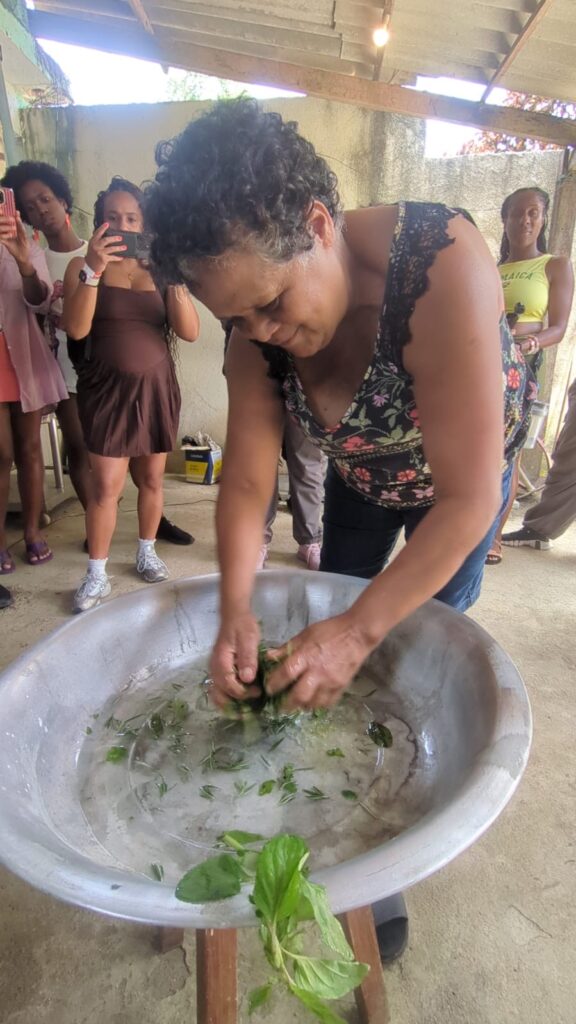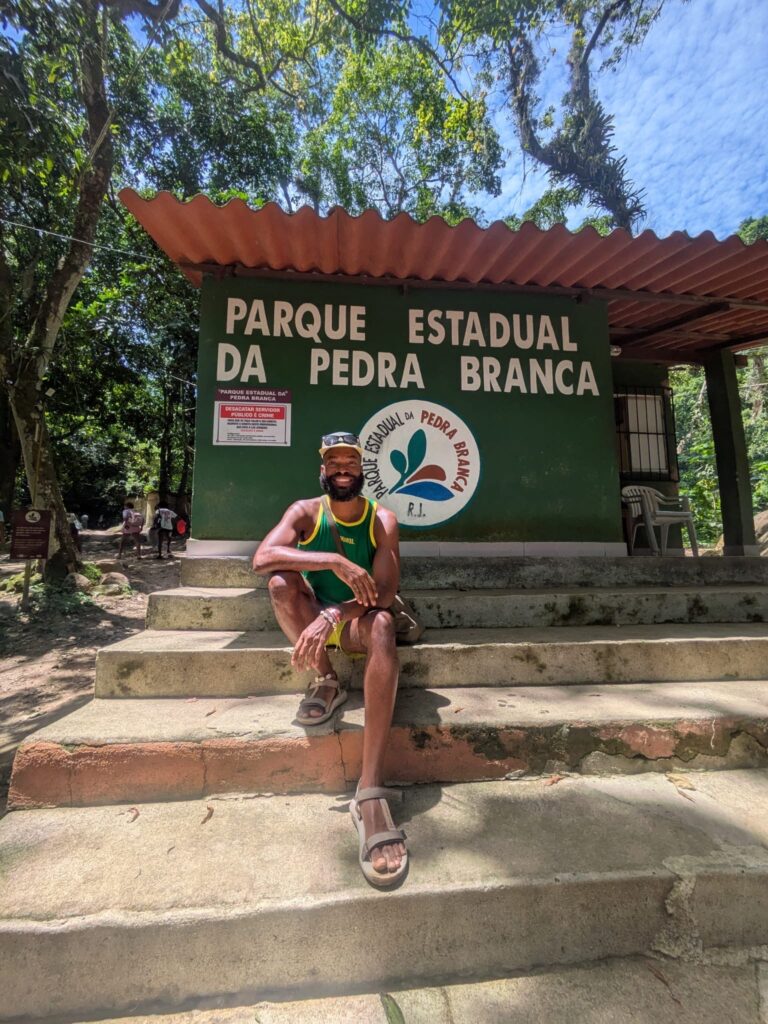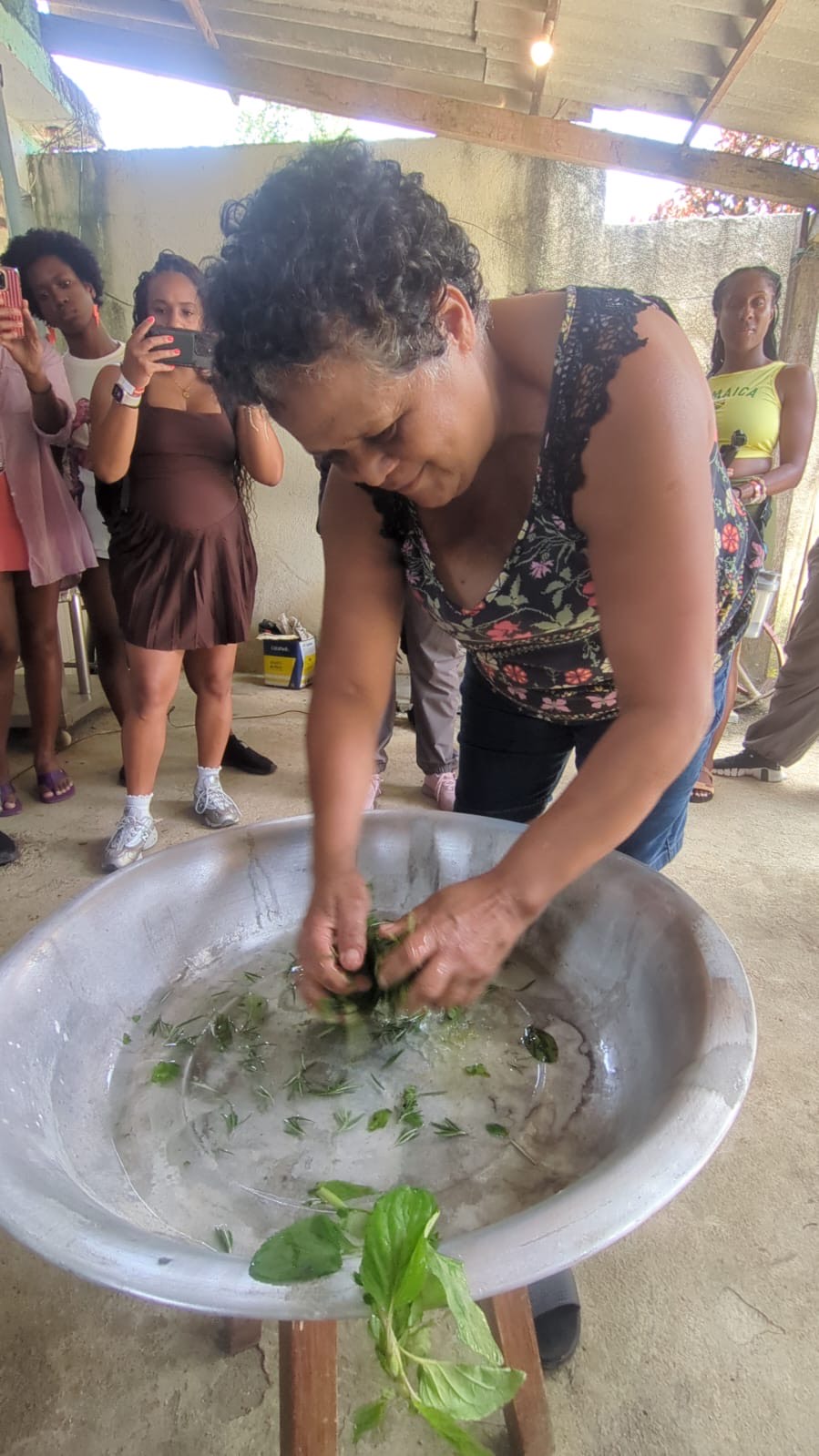RIO DE JANEIRO — On a typically sunny day in this Brazilian city, dozens of Black content creators, entrepreneurs and travelers from across the world set out to discover the Black side of Rio de Janeiro. This was the first day of the four-day Black Travel Summit (Nov. 13-16). Instead of heading to the world-famous Copacabana Beach or Sugar Loaf Mountain, they visited Rio de Janeiro’s Black heritage sites and neighborhoods that, until recently, have been overlooked on the city’s tourist itinerary.
One group toured Rio de Janeiro’s Little Africa, a downtown historic area whose port received more captured Africans than any other in the Transatlantic Slave Trade — an estimated 1 million people. Others opted for a food tour to sample Brazilian cuisine at some of Rio’s most heralded Black-owned restaurants.
A third group visited Cafunda Astrogilda, a modern-day quilombo, or settlement, of 100 families on the outskirts of Rio. The word quilombo originates from the Quilombo of Palmares, a self-sustaining “maroon” community of escaped enslaved Africans, formed in Brazil’s northeast in the 17th century. The Cafunda Astrogilda quilombo sits in a protected forest, and offers visitors guided hiking tours and homemade food from an onsite restaurant, as well as workshops on its history and spirituality. The community’s spiritual leader even made an herbal bath for the visitors.

“The visit was led by people from the community,” said Ronnell Perry, a Black American travel content creator. “We were engaging them in things they do regularly. They weren’t performing for us. Whatever money we were paying was going directly to the families.”
The entrepreneur originally from Illinois and based in Salvador, Brazil, said it was his first time visiting a quilombo.
The recent tours were part of the Black Travel Summit, brought to Rio de Janeiro by the Black Travel Alliance with financial backing from Embratur, Brazil’s federal tourism agency. It was the first time the conference left the United States, and for Embratur and its Afrotourism coordinator, Tânia Neres, the gathering was more than a marketing splash. It crowned a broader effort inside Brazil’s tourism bureaucracy to recognize Black-led itineraries, quilombo communities, and Afro-Brazilian guides as central to the country’s appeal. As Brazil courts a global Black travel market and responds to its own Black majority, Neres is betting that Afrotourism can be written into public policy, turning visits like these into an anti-racist tool and a stable source of income for communities long left off the official map.
The interactions at the summit were exactly what Neres imagined more than two years ago when she took on the role as coordinator of diversity, Afrotourism and Indigenous people at Embratur, the official agency in charge of promoting and marketing Brazilian destinations internationally. Neres has spent most of her life in Salvador, often called Brazil’s “Black Mecca.” She worked more than two decades on the commercial side of tourism before it really hit her how rarely Black Brazilians showed up in the glossy brochures she was helping to produce — she remembers having to buy stock photos of Black American families because Brazilian resorts didn’t have their own of Black Brazilian people. That disconnect nudged her toward Brazil’s emerging Afrotourism scene, where she helped put together Salvador’s “Capital Afro” campaign and started working more closely with Black tour guides, quilombos, and grassroots entrepreneurs. Today, Neres frames Afrotourism as both personal and political: a way to reclaim Brazil’s Black history, redistribute tourism income to Black communities, and turn the country’s tourism policy itself into an anti-racist tool.
“The empowerment that Afrotourism provides is this: people understand that it’s not ‘traditional tourism,” Neres said. “It’s tourism with a cause.”

Black awareness
According to the Brazilian Institute of Geography and Statistics (IBGE), more than half of Brazilians (55.5%) are Black, a category that includes both Black and mixed-race people. Brazil has the largest population of Afro-descendants outside Africa, and African and Afro-Brazilian heritage runs through the country’s food, music and religion.
Long before Embratur took notice, Black Brazilian travelers and entrepreneurs were already building Afrotourism. The 2011 unearthing of Rio de Janeiro’s Cais do Valongo — the port that received more enslaved Africans than any other in the Americas — sparked new interest in the surrounding “Little Africa” district and helped fuel a boom in Afrocentric walking tours. In 2013, driven by a desire to promote sustainable tourism and connect visitors with quilombo communities, Thais Rosa Pinheiros founded Conectando Territórios and became one of the first guides to offer regular tours of Little Africa. Four years later, journalist Guilherme Soares Dias launched the Guia Negro (Black Guide) blog and began helping people explore “Black São Paulo” on foot.
“I was 20 and in college when I first visited a quilombo,” Pinheiros recalled. “I thought, ‘Oh my God, why am I only learning about this now?’ My idea was that people would learn Black history through the communities themselves — told by the residents.”
At the time, the word Afrotourism (Afroturismo in Portuguese) wasn’t really in circulation. But that changed.
Neres enters the picture
From the moment Neres started her job, Embratur began rolling out a multilayered plan to make Afrotourism a permanent part of how Brazil sells itself. Her first moves were changing what Brazil showed to the world: training Brazilian diplomats in Africa in anti-racist tourism, securing a multi-page Afrotourism spread in South African Airways’ inflight magazine, and then place Afrotourism at the center of Brazil’s trade fairs and marketing campaigns before layering on trainings, research and business matchmaking.
Inside the agency, Embratur created a diversity and inclusion committee and started rethinking who benefited from its programs.
“We believe that all our activities — familiarization tours, press trips, grant applications — should prioritize Black women. Then Indigenous women. Then trans women. … Then Black men, Indigenous men,” Neres said. “We inverted the pyramid to give these people a leading role.”
New money helped speed things up. The CAF Development Bank of Latin America and the Caribbean gave Embratur $150,000 to promote Afrotourism. “I didn’t need to repay the money, I just needed to do the work,” Neres said. “That’s what made so many things happen.” In 2024, Embratur launched its first international tourism campaign built around a Black woman as the main character — “It’s spectacular! It’s for you!” — instead of showing Black Brazilians only as hotel staff, entertainers, or background extras.
This year, Neres took Afrotourism leaders to international and national tourism conferences, where tourism operators opt to buy the experiences. She also used the CAF funds to hire Black influencers and researchers, run webinars and capacity-building trainings, and organize “rodadas de negócios” (business meetings) that matched quilombo leaders and favela tour operators directly with foreign buyers at trade shows. Embratur’s stands at major fairs in the United States, France, Germany, and Portugal began to foreground Afrotourism experiences, while new digital campaigns pushed a more explicitly Black, diverse Brazil into the social media feeds of young travelers abroad.

In parallel, Brazil’s Ministry of Tourism was also trying to put some structure around a growing movement. Having already dedicated a decade of her life to Afrotourism, Thais Pinheiros was hired as a consultant to define the term and map the national ecosystem.
“We identified 43 experiences around Brazil — and today there are many more,” Pinheiros said.
Neres also started courting diaspora influencers like Martinique Lewis, the co-founder of the Black Travel Alliance, which hosts the Black Travel Summit (BTS). After inviting her on a tour of Salvador, full of Afro-Brazilian tourism experiences, Neres decided to bring BTS to Rio de Janeiro. BTS takes place annually and attracts more than 300 people for four days of workshops, give-back sessions, star-powered experiences and a gala.
“I became Black Tinder, Tinder for Black Travel,” Neres said. “I wanted to connect [Afrotourism operators] with negotiators who are saying that Black travelers spend $145 billion. I want $5 billion, $10 billion in spending by Black travelers in Brazil.”
She’s matchmaking between Black travelers’ spending power and Black-led operators.
It didn’t escape Neres that just as Rio de Janeiro was hosting the Black Travel Summit, two favela communities were still reeling from the massacre of more than 120 men by police two weeks prior. Neres sees Afrotourism as a tool to help young Black men, often targeted by police, to build sustainable careers.
Neres and Pinheiros were honored for their work in Afrotourism at the Black Travel Summit. Pinheiros won advisor of the year, which highlights someone whose guidance and cultural insight have transformed how Black travelers experience Black travel.
“This award reaffirms that Afrotourism in Brazil is a global potential, a tool to transform what connects identity and remembrance, and rewrite the history of the African diaspora,” she wrote on Instagram.
Neres was honored with the Sankofa Impact Award. As she took her award, the crowd chanted her name “Tânia! Tânia!.”
Her priority for the next year is to ensure that Afrotourism is never discarded from Embratur’s work — a valid fear if Brazil elects a far-right president next year.
“We are afraid,” she said. “But they also need to be afraid, because if this is how we managed to increase [international tourism in Brazil] from 6 million visitors to 8 million visitors, maybe even 9 million, do you think it’s easy for them to end this and still meet their tourism goals?”
Neres is part of an interministerial government committee called Black Route (Rotas Negras), whose mission is to promote racial equality through the valorization of Afro-Brazilian heritage in tourism.
“Afrotourism is not yet a public policy,” she said. “Public policy is when it becomes a state policy where if I leave, everyone leaves, nobody can interfere with it.”






